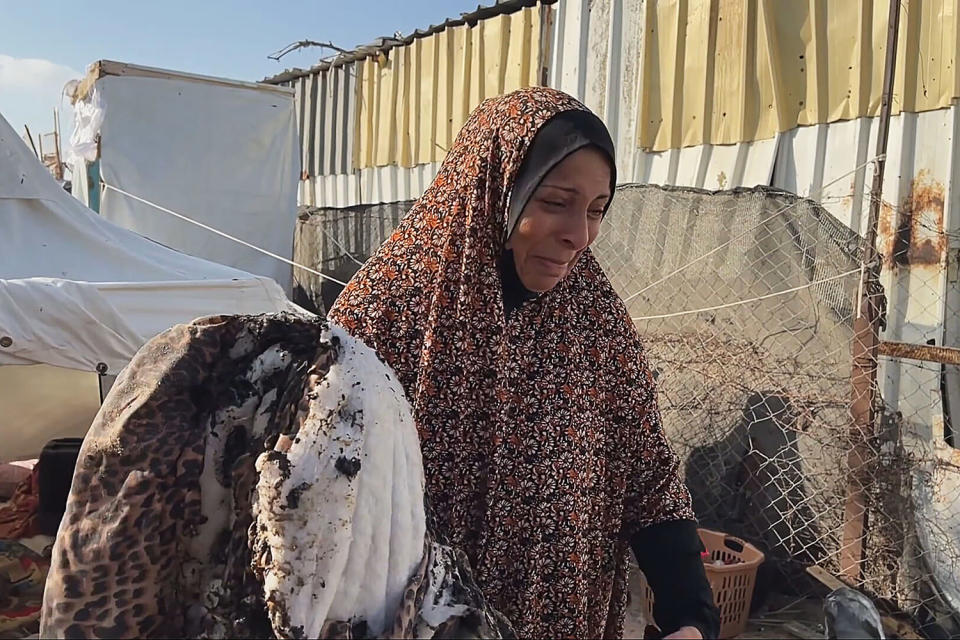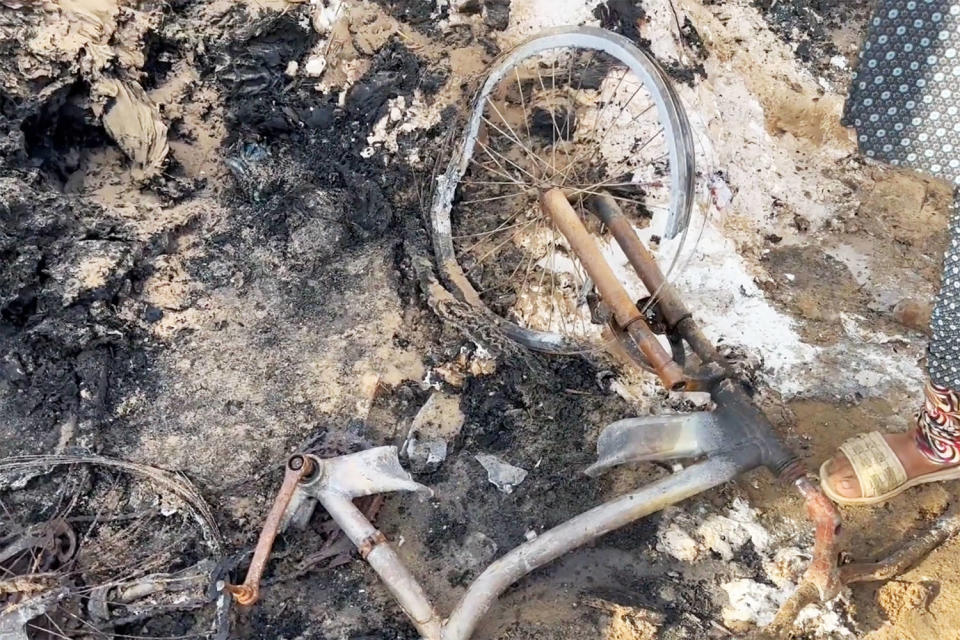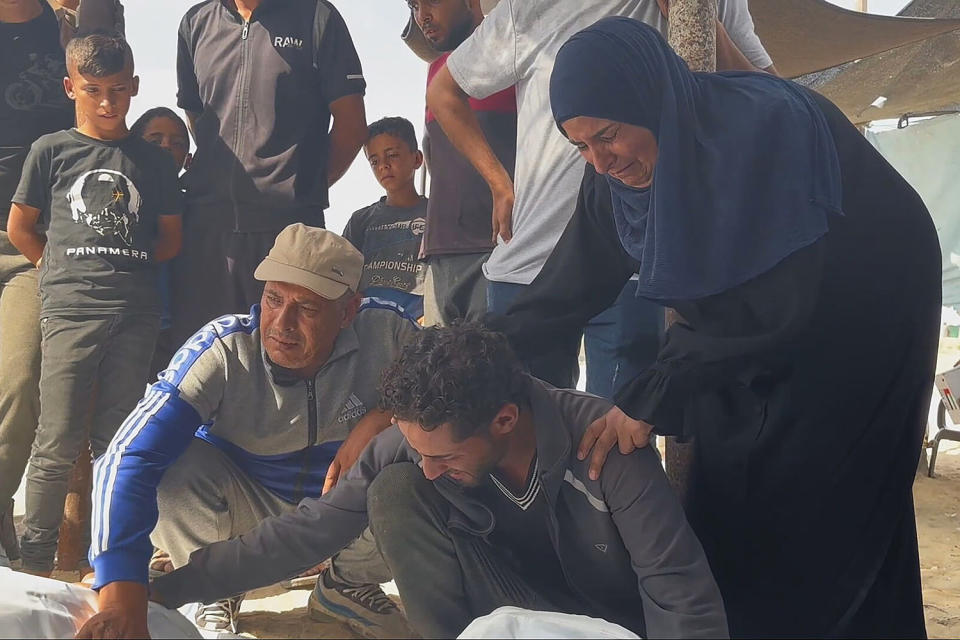Palestinians reel from repeated strikes on 'humanitarian zones'
The cuts on her feet from a strike she survived two weeks earlier had yet to heal, Asma Al-Sarafendi said, before more shrapnel embedded itself into the flesh of her leg during a strike this week on a designated humanitarian zone in southern Gaza.
The Wednesday strike on Al-Mawasi began just after midnight, Al-Sarafendi said, as she was sleeping with her husband and five children — Mouna, Shorouq, Layla, Asaad and Mhamad. They were awoken by aircraft overhead before flames engulfed the area around their tent, she told an NBC News crew in Gaza.
“People screaming, people on fire, men taking the children outside,” Al-Sarafendi said, describing the moments that followed. “We were all injured.”
She and one daughter suffered shrapnel wounds, while another’s scarf melted onto her skin, Al-Sarafendi said. Her husband, Abu Mustapha Al-Sarafendi, took their son and another daughter to the hospital with burns and shrapnel wounds, she added.
“I don’t have any news about them,” Al-Sarafendi said.

The Israel Defense Forces have repeatedly struck Al-Mawasi — an inhospitable patch of land north of Rafah that has expanded into a crowded tent city — despite having designated it a safe humanitarian zone. An investigation by NBC News into seven deadly airstrikes found Palestinians were killed in areas of southern Gaza that the Israeli military had explicitly designated as safe zones, including Al-Mawasi. In May, 21 people were killed in a strike on the camp, according to Reuters, an attack the Israeli military denied.
The IDF did not respond to a request for comment from NBC News to confirm it had attacked the area in Al-Mawasi on Wednesday.
On Friday, another round of blasts at Al-Mawasi killed at least 25 and injured 50, according to the Gaza Health Ministry.
The International Committee of the Red Cross, a humanitarian organization, said strikes hit within yards of its offices and residences, which are surrounded by hundreds of displaced people in tents. “Firing so dangerously close to humanitarian structures puts the lives of civilians and humanitarians at risk,” the ICRC said on X.
The Israeli military said that “there is no indication that a strike was carried out by the IDF” inside the humanitarian zone, referring to Friday’s incident, adding that it was under review. According to The Associated Press, the locations of the blasts provided by the Civil Defense in Gaza and the Red Cross hospital appear to be just outside Al-Mawasi’s designated humanitarian zone.

Witnesses interviewed by NBC News’ crew in Gaza after the attack on Wednesday said shots were fired from an aircraft into the camp between 12:30 a.m and 1:00 a.m. Then, about five minutes later, came a missile or bomb, which sent shrapnel scattering and ignited fires in the camp.
For Al-Sarafendi, her accounting of the damage and injuries stretched from the chaos of Wednesday night back to the attacks that had pushed her family into Al-Mawasi in the first place, as the grinding regularity of one violent assault bled into the other.
On June 8, Al-Sarafendi, who is originally from Rafah, was sheltering in Nuseirat, in central Gaza, when Israeli forces conducted an operation to rescue four hostages, killing at least 270 people, according to Palestinian health authorities. Hundreds more were injured, including Al-Sarafendi. While Palestinian officials do not distinguish between civilians and fighters when reporting casualty figures, 64 children were reported to have died in the attack.
The family then walked from Nuseirat to Al-Mawasi, where her brother had carved out a space for her family.
“This is the humanitarian region they asked us to take refuge in,” Al-Sarafendi said in tears. “My brother saw me, he couldn’t believe I am alive. ... He kissed my feet, hugging me and saying, ‘Thanks to Allah you’re safe.’”
Before the war, Al-Mawasi was a tiny fishing village on Gaza’s Mediterranean coast. The village has grown into a densely populated tent city since the start of the war, becoming more crowded as some of the more than 1 million people who were sheltering in nearby Rafah fled the ground invasion that began there last month.
According to WAFA, the Palestinian news agency, at least seven people were killed in Wednesday’s strike and dozens more injured. Video filmed by rescuers and obtained by NBC News showed several people, apparently dead, blood pouring from their mouths, being pulled from a warehouse as it was engulfed in flames.
At a makeshift morgue, Amu Mhamed Abu Amara mourned over her relatives, including her niece Mariam Mhamed Slimane Abu Amra, whose unborn child, Abu Amara told the NBC News crew, had died with her in the attack.

“She had a baby in her belly, she was pregnant,” Abu Amara said. “We were safe in Rafah, and here we are displaced and our houses are gone, our children are gone, there’s no safe place in Gaza.”
Another woman assessed the charred remains of her tent.
“Kill us in one hit and let’s end it,” she told NBC News.
This article was originally published on NBCNews.com

